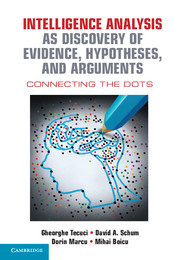Book contents
- Frontmatter
- Contents
- Preface
- Acknowledgments
- About the Authors
- 1 Intelligence Analysis: “Connecting the Dots”
- 2 Marshaling Thoughts and Evidence for Imaginative Analysis
- 3 Disciple-CD: A Cognitive Assistant for Connecting the Dots
- 4 Evidence
- 5 Divide and Conquer: A Necessary Approach to Complex Analysis
- 6 Assessing the Believability of Evidence
- 7 Chains of Custody
- 8 Recurrent Substance-Blind Combinations of Evidence
- 9 Major Sources of Uncertainty in Masses of Evidence
- 10 Assessing and Reporting Uncertainty: Some Alternative Methods
- 11 Analytic Bias
- 12 Learning and Reusing Analytic Expertise: Beyond Disciple-CD
- Glossary of Terms
- References
- Appendixes
- Index
2 - Marshaling Thoughts and Evidence for Imaginative Analysis
Published online by Cambridge University Press: 05 August 2016
- Frontmatter
- Contents
- Preface
- Acknowledgments
- About the Authors
- 1 Intelligence Analysis: “Connecting the Dots”
- 2 Marshaling Thoughts and Evidence for Imaginative Analysis
- 3 Disciple-CD: A Cognitive Assistant for Connecting the Dots
- 4 Evidence
- 5 Divide and Conquer: A Necessary Approach to Complex Analysis
- 6 Assessing the Believability of Evidence
- 7 Chains of Custody
- 8 Recurrent Substance-Blind Combinations of Evidence
- 9 Major Sources of Uncertainty in Masses of Evidence
- 10 Assessing and Reporting Uncertainty: Some Alternative Methods
- 11 Analytic Bias
- 12 Learning and Reusing Analytic Expertise: Beyond Disciple-CD
- Glossary of Terms
- References
- Appendixes
- Index
Summary
SHERLOCK HOLMES AND INVESTIGATION OR DISCOVERY
If you have read any Sherlock Holmes mysteries, you know that Holmes had several foils in the form of rather incompetent police investigators such as Inspector Lestrade and Inspector Gregory. Confidently believing that they had a case solved, Lestrade or Gregory had obviously overlooked details that were observed and then imaginatively analyzed by Holmes. In one case, The Boscombe Valley Mystery (Baring-Gould, 1967, vol. II, p. 148), Holmes tells his colleague Dr. Watson:
“By an examination of the ground I gained the trifling details which I gave to that imbecile Lestrade, as to the personality of the criminal.” Watson asks: “But how did you gain them?” Holmes replies: “You know my method. It is founded on the observance of trifles.”
As an intelligence analyst, you are confronted daily with hundreds, perhaps thousands, of trifles or details. We could also refer to Sherlock Holmes’ observed trifles as one form of dot that we must try to connect. Taken alone, an individual trifle may mean very little. But some of them, taken in combination, may suggest new and important hypotheses or possibilities that should be taken very seriously. The trick is to be able to identify which combinations of trifles to examine carefully and which ones to ignore. This is where alternative schemes for selecting and marshaling trifles, together with our thoughts about them, become all important. As we noted in Section 1.1.4, it would not make any sense to examine all possible combinations of trifles, even if we could do so. Considerable imagination is required, both in deciding which trifle combinations to examine and in generating new and productive hypotheses from the trifle combinations you have identified. Given the extreme perils faced today, we need more Sherlock Holmeses and fewer Inspector Lestrades.
Sherlock Holmes also seemed particularly adept at asking questions as his investigations unfolded. The process of discovery involving the generation of new hypotheses or possibilities rests crucially on the questions we ask. One noted logician claims that Sherlock Holmes’ imaginative feats of skill were largely due to his skill at inquiry, the asking of questions (Hintikka, 1983, pp. 170–178). If we do not ask appropriate questions, as our intelligence investigations unfold, we stand little chance, without an abundance of luck, of generating hypotheses that stand some chance of containing truth.
Information
- Type
- Chapter
- Information
- Intelligence Analysis as Discovery of Evidence, Hypotheses, and ArgumentsConnecting the Dots, pp. 28 - 44Publisher: Cambridge University PressPrint publication year: 2016
